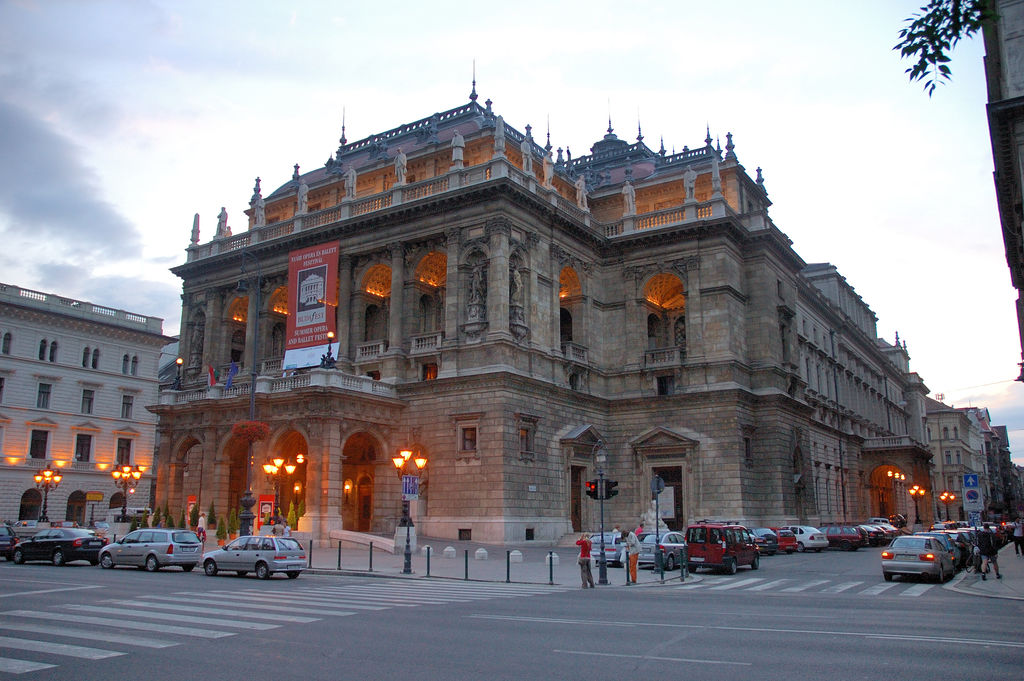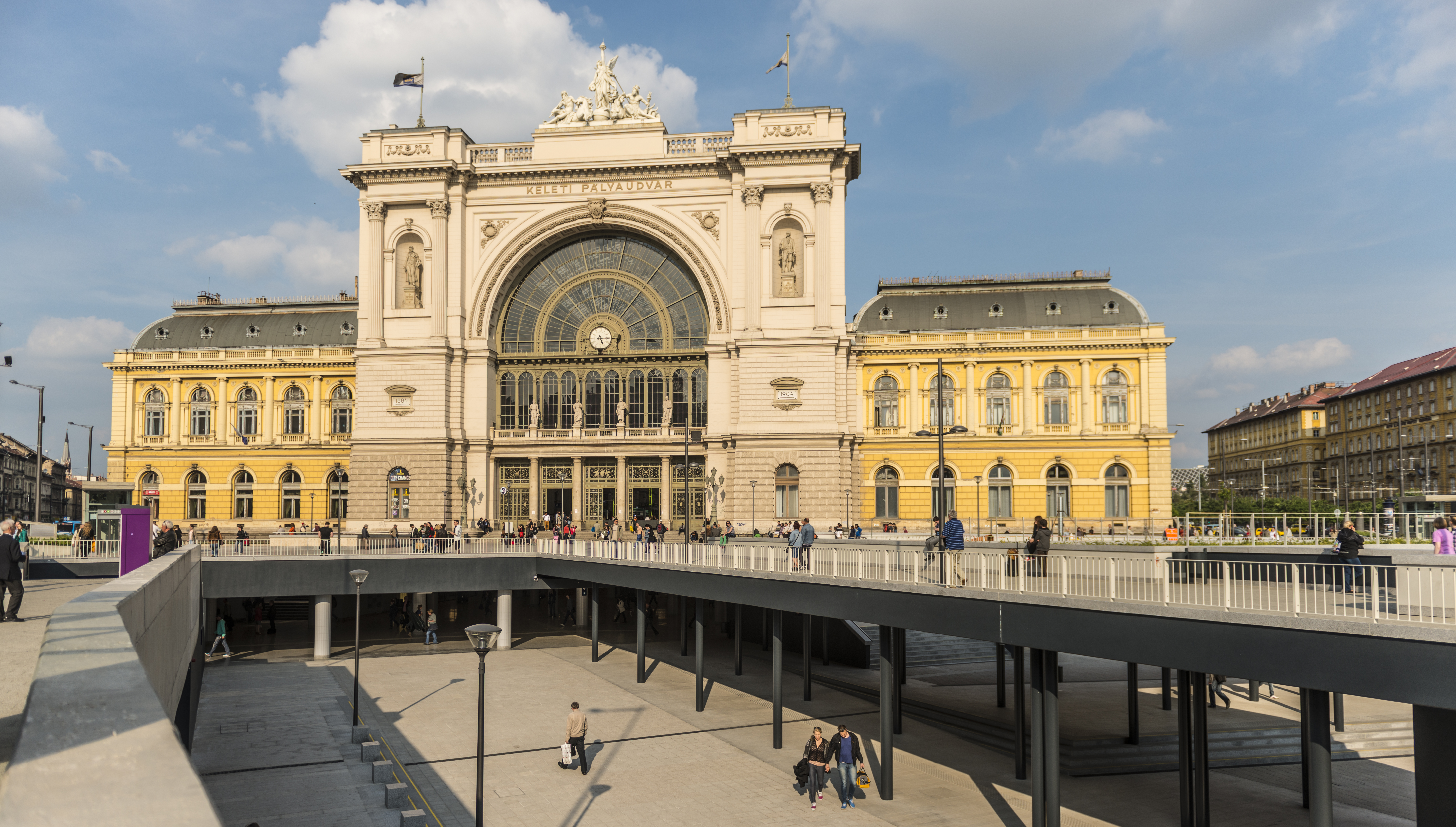Living in Budapest, Magyarország (Hungary) made me think in different ways in order to express myself in Hungarian, see the modern incarnations of a dark chapter of European history and hatred and fend off unwanted late-night callers.
Nagyon nehéz, very difficult
I wasn’t the studious Hungarian learner I was supposed to be in the weeks prior to my college semester in the Hungarian capital. I waited to start my Hungarian language learning on the Malev Airlines flight to Budapest. In flight, I listened to the magyar (Hungarian) language tapes and got an introduction to how the Hungarian language is nagyon nehéz, very difficult. I heard the pronunciation of the alphabet and learned that many words carried the “sh” and “zh” sounds. Even though Hungary is bordered by countries from the Germanic, Slavic and Romance language groups, the Hungarian language is part of the Finno-Urgic language group, along with Finnish and Estonian.
Hungarian made me think in a new way about gender and forced me to learn a new prosody (melody of the language). There was no pronoun for “he” or “she” when speaking in the third person singular, so I formed my sentences about men or women without thinking about their gender. The 3rd person singular pronoun ő means “she/he.” It was a strange change from Latin languages and Russian where the gender of the noun affected the adjectives and in Russian, also the past tense of the verbs. Hungarian had so many prefixes and suffixes that it took a great deal of concentration to form a sentence.
One of the interesting elements of the language was that the phrase “nem tudom” meant both “I don’t know” and “I can’t.” Knowing and being able to are the same in the mind of a Hungarian speaker, whereas in all of the other languages I knew, being able to do something and knowing were distinct ideas.
As the weather switched from summer to fall to winter and the weather got cold and snow appeared, the combination of the melancholic prosody (melody of the language) and the cold brought my spirit down. On a phonetic level, I felt much sadder when I spoke in Hungarian because the stress of each word landed on the last syllable. It felt like the front part of my mouth had to work all the time. I didn’t use other parts of my face to create sounds like I did with other languages. There were no nasal sounds like in Russian or a guttural “r” like in French. The predictable rhythm didn’t permit the melodic ups and downs of Italian and Spanish. Despite the phonetic effort being limiting, the grammatical structure of the language was extremely complex. With 18 case suffixes for nouns, many of which I never learned, and other challenging grammatical elements, Hungarian was not for beginners!
Italian opera made me read and speak in magyar

The beauty of the city and many cultural offerings were a counter balance to the difficulty of the language. Budapest had been the second most important city in the Hapsburg (Austro-Hungarian) Empire. Buda was the old part of the city, housing the Buda Castle and the Gellert bathhouse and many more beautiful architectural gems.

One of my favorite things to do was walk in Budapest and take in the stunning architecture, go to the famous bathhouses, walk in the parks and go to the Hungarian State Opera House as it was very inexpensive (2-3 USD a ticket).
Even though I was living in Budapest, I didn’t have to speak a lot of Hungarian on a regular basis besides using basic Hungarian in shops. When I needed to do something important at the bank or travel agency, I found Hungarian office staff who spoke English.
It was during my weekend dedicated to Puccini, an Italian opera composer, when I was forced to both read and speak Hungarian. My Hungarian operatic evenings were a bilingual experience: listening to the Italian sung and reading the Hungarian supertitles. On a Friday, I saw the season premiere of Puccini’s Turandot opera. While listening to Non piangere Liu aria I felt goosebumps on my arms. I was so taken by the music that I had to come back two days later to see the opera again. On Saturday, I reveled in the glorious arias of Lucevan le stelle and Vissi d’arte in the opera, Tosca. I don’t remember if I had bought a program in English so I really had to pay attention to follow the story.
[embedyt] https://www.youtube.com/watch?v=NLR3lSrqlww[/embedyt]
“Vissi d’arte” from the opera “Tosca”, as sung by Maria Callas (I heard the aria sung by another opera singer in Budapest, Hungary)
I met a gay male couple at the opera. One man spoke Russian and the other spoke some English. We stood in the metro station after the performance alternating from Hungarian, Russian and English discussing my stay in Hungary and appreciation for the opera. It took a dead Italian composer to make me read and speak in Hungarian!
Wrong phone number: Hungarian phone sex line
Something else also forced me to speak in Hungarian, but it was not as pleasant as listening to opera. Once I moved into my second apartment, I got a lot of phone calls from Hungarian men. At first, I thought they were calling because they had seen an advertisement for the apartment for rent. In my very limited Hungarian, all I could say was “lakás nincs” (no apartment). One of the callers figured out that I spoke very little Hungarian and asked if I spoke English. He explained that he wasn’t calling to rent a room, but for “phone sex”. Somehow, my phone number was in a phone sex ad in some newspaper or elsewhere!
My friends thought that maybe my landlord had been running an extra business on the side in his apartment prior to renting me the apartment. My landlord claimed that he was innocent and had no idea how the apartment phone number had been advertised for such a business and he said he did not know how to stop these calls.
I set up a system with my friends when they wanted to call me. They called, let the phone ring once and then they would call again.
In case you’re wondering, I did not entertain the Hungarian male callers!
Hitler’s Mein Kampf above my head, then my feet
Budapest wasn’t just about language learning, opera, thermal bath houses, architectural beauty and fending off unwanted male callers. I had a stark reminder about xenophobia and ethnic hatred.
The first apartment where I lived in Budapest was owned by a German translator. The apartment had many bookshelves with German books. I was no German bibliophile, nor did I know German, but there was one book title that was so infamous that it didn’t need translation: Mein Kampf. Hitler’s manifesto sat on the bookshelf above my head on the small couch where I slept. After that discovery, I changed positions and slept with my feet facing the bookshelf. I didn’t want the mass murderer’s words above my head. After three weeks in the Mein Kampf apartment, I moved to another apartment by the Danube River with a view of the Szechenyi Bridge. I gladly traded Mein Kampf for the lone Picasso book sitting on the coffee table.

When I went back to my first apartment to pick up some of my belongings, Hitler’s legacy still followed me, but this time it was in Hungarian and not German. I exited the Keleti Pályudvar train station and saw a big rally in the open-air part of the station. Many young bald men were holding up their right arms in a salute, reminiscent of Hitler’s SS trademark. I was confused because their red and white armbands didn’t have any swastikas. Although my Hungarian was basic, it was enough to decipher the racist slogans about “the white race” and “no more immigrants.” Ironically, some Chinese immigrants explained in a mix of Hungarian and English that these men were neo-Nazis. Since the Hungarian government forbade the use of Nazi symbols, the neo-Nazis had to create new signs for their white supremacist movement.
When my parents came to visit, we spotted a group of skinheads riding the bus from the Buda side of the city to Pest at night. Even though neo-Nazi movements were on the rise in former Communist and Socialist countries, I didn’t imagine that I would come face-to-face with Hitler’s contemporary disciples.
This fervent rejection of people who were not Hungarian was striking, especially because of what I had learned about how ethnic Hungarian minorities were treated in Slovakia and Romania. My class took a bus trip to Transylvania, Romania, where we stayed in ethnic Hungarian villages, where the people still wore traditional Hungarian dress and spoke magyar. This minority felt discriminated against in Romania and some wanted to move to Hungary, even though they would be noticeably different in Hungary because of their accent. However, just because there were ethnic Hungarians outside of Hungary who felt repressed didn’t mean that the Hungarian government felt empathy for other oppressed people or foreigners.
I have never seen neo-Nazis up close again anywhere in the world. But the shock and fear I felt at seeing the neo-Nazis in Budapest is something I doubt I will ever forget. It was the first time I felt such strong hatred and preparedness for violence.
After seeing ethnic hatred up front, I wasn’t surprised to see Viktor Orbán, the current Hungarian Prime Minister, close the borders in 2015 so that refugees fleeing Syria, Afghanistan and Iraq couldn’t move towards Austria, Germany and other Western European countries. Since the refugee crisis started in 2015, Orbán has shown the world that he doesn’t want non-Christians and non-whites in Europe. In 2018, Orban has made it illegal for Hungarians to help asylum seekers in Hungary.
—
I have returned to Budapest several times and revel in its beauty. I still recognize some words on signs and advertisements and can say some pleasantries, buy a metro ticket and food in a store or restaurant. But to say that my Hungarian is rusty would be an overstatement.












